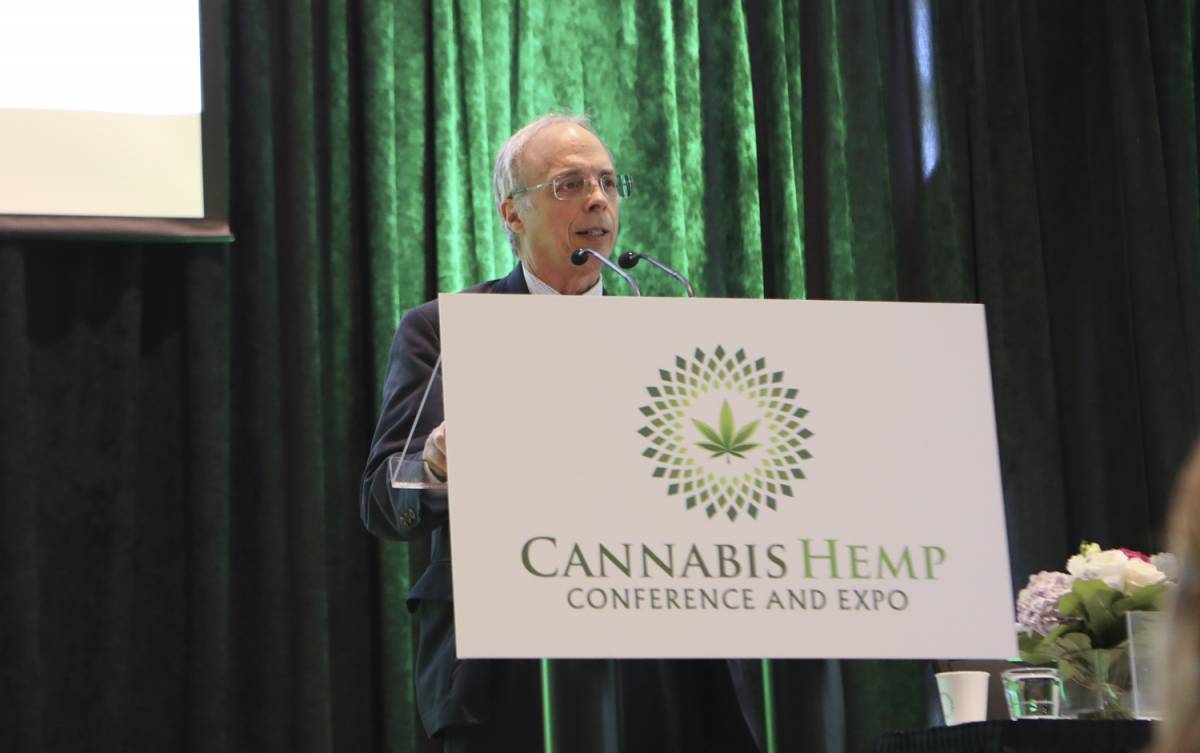Neurologist and researcher in the field of psychopharmacology, Ethan Russo is an unavoidable figure in the field of cannabis for medicinal purposes, currently being the director of research and development of the ICCI — International Cannabis and Cannabinoids Institute (International Institute of Cannabis and cannabinoids).
Graduated in Psychology from the University of Pennsylvania and in Medicine from the University of Massachusetts, he started out working in pediatrics and was a clinical neurologist for about 20 years, before joining the International Cannabinoid Research Society (International Society for Cannabinoid Research) and International Association for Cannabinoid Medicines (International Association for Cannabinoid Medicines), also being part of the Scientific Council of American Botanical Council (American Botanical Council).
He was Medical Director of PHYTECS, a biotechnology company that investigates the human endocannabinoid system (ECS) and between 2003 and 2014 was a medical consultant at GW Pharmaceuticals, in clinical trials of drugs such as Sativex or Epidiolex.
Author of seven books on cannabis and medicinal herbs, he has also published over 50 scientific articles in the fields of neurology, pain management, cannabis and ethnobotany and has trained in over 30 countries.
At the invitation of Cannapress, he will come to Portugal next November to be the keynote speaker at a conference on medical cannabis. But before that, Ethan Russo answered a few questions.
What sparked your interest in studying the potential medicinal applications of cannabis? How did you discover the plant?
In 1990, after seven years of clinical practice in neurology, I felt that I was giving more and more toxic drugs to many of my patients, with less and less benefit. So I revived an old interest in medicinal plants, which took me to the Amazon rainforest in Peru to study the indigenous flora used by the Machiguenga people to treat migraines and other ailments. When I returned in 1996, I quickly became involved in the cannabis controversy. The incredible history of cannabis as a medicine, as well as the abundant publications on its benefits, captured my imagination and made it the center of my career. Although I had known cannabis long before, I came across it professionally in 1980 when I was a neurology resident, and I met a man at Seattle Veterans Hospital who mixed cannabis into his pipe tobacco as a treatment for myasthenia. serious. Thanks to that, he practically avoided hospital admissions. Later, even in the 1990s, about a third of my MS patients used cannabis successfully for pain and spasticity, as well as a wide variety of other ailments: migraines, chronic pain, Parkinson's and Huntington's diseases. , and even epilepsy.

Ethan Russo is the current director of research and development at ICCI — International Cannabis and Cannabinoids Institute PHOTO: DR
How would you explain medical cannabis to a patient who has never heard of it?
Cannabis is a medicinal plant whose use by humans dates back to times before documented history. As a herbal remedy, it contains a combination of ingredients that together stimulate its activity (synergy) and produce a versatile therapeutic agent for many diseases in which conventional medicines fail. In part, this is because cannabis works on the endocannabinoid system, an innate regulator of bodily functions that serves to maintain homeostasis (a desired balance of physiological functions).
Portugal is about to legalize medical cannabis, but there are still many doctors and psychiatrists convinced that cannabis causes psychosis or schizophrenia. What do you have to say about these convictions and what is your experience as a neurologist?
Cannabis is like any other medicine. It has side effects, but they are well-researched and well-known, and in this case, they are entirely preventable. There is an abysmal difference between smoking cannabis recreationally, when the intention is to produce psychoactive effects, and using cannabis therapeutically, by administering it unsmoked in doses that are used to control symptoms. In fact, cannabis is far less dangerous than most conventional drugs and does not cause schizophrenia in individuals who do not have a prior predisposition to this disorder. Furthermore, there is no single dose of cannabis that can cause death, unlike opiates, as there are few cannabinoid receptors in the respiratory centers of the brainstem, and it has a remarkable margin of safety when appropriate preparations are used wisely.
In his 2011 publication in the British Journal of Pharmacology, “Taming THC”, he stated that, to date, many cannabinoids, terpenoids and flavonoids remained unstudied. Do you think this situation has changed in recent years? How?
It hasn't changed as quickly as it should! I continue to research and write about this topic. We currently have a study starting in the US with Ryan Vandrey of Johns Hopkins University, funded by the National Institutes of Health, which we hope will provide evidence of the synergistic contributions of terpenoids to the effects of THC.
How important are the synergistic effects of cannabis and how might they impact medical advances in the future?
The synergy of cannabis ingredients can have two benefits:
1) The stimulation of a desired activity, such as combining two or more analgesic ingredients to reduce pain and inflammation (eg THC plus CBD plus caryophyllene);
2) Certain terpenoid components reduce the side effects of THC. A good example is the ability of alpha-pinene, an acetylcholinesterase inhibitor, to reduce the impairment of short-term memory produced by THC. These types of formulations may prove to be better cannabis-based medicines.
In your opinion, what is the ideal scenario for a country that is about to legalize medical cannabis? Do you think that it is enough to sell cannabis as a medicine in pharmacies or should the entire plant also be made available?
Various approaches should be developed. While I continue to believe that prescription cannabis medicines are necessary in many situations, there will always be room for well-grown and produced herbal preparations.

Ethan Russo with Raphael Mechoulam and Yechiel Gaoni, the two scientists who first isolated the THC molecule in 1964. PHOTO: DR
Do you think that patients should be allowed to grow their own cannabis, under medical advice?
Yes. Patients who are physically able to grow their own cannabis show signs of benefiting greatly from this activity and the ability to help themselves.
Given the complexity of the ECS (endocannabinoid system), cannabinoids (both endogenous and exogenous), and the countless interactions in which they participate or processes that they modulate, it can be said with certainty that a particular branch of medicine, pharmaceuticals or even a new exclusive branch to be included in higher education cycles. What do you think about this, and how do you think cannabis education should be addressed in the future?
Currently, cannabis-specific education is available from a variety of sources, such as Americans for Safe Access (Americans for Safe Access), The Answer Page (The Answers Page), and the Society of Cannabis Clinicians (Society of Cannabic Doctors). Unfortunately, education on cannabis and even the endocannabinoid system is woefully inadequate in medical schools around the world. That needs to change. Certification of knowledge about cannabis as a medicine is now available, and is mandatory in certain areas in order to be able to recommend or prescribe it.
How do you envision cannabinoid-based medicine in the next 20 years?
As cannabis drugs become more available, there will be increasing recognition of their value in many types of refractory disease. Attitudes will slowly change as people and politicians become aware of its safety, and as the benefits of this safer drug become evident. With cannabis clinical trials, the best is yet to come!
__________________________________________________________________________
Featured Photo: Amanda Siebert – The georgia straight
Translation: João Vasconcelos
































